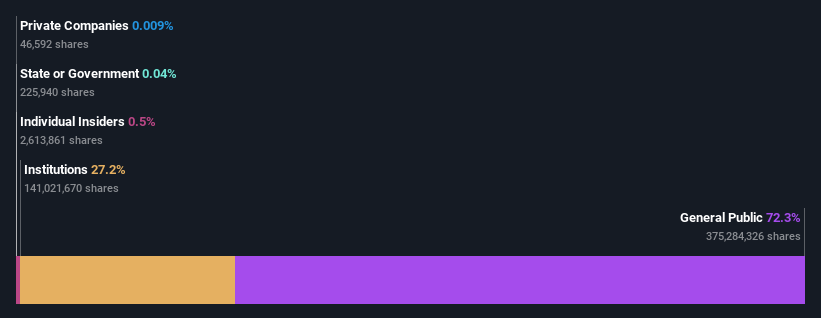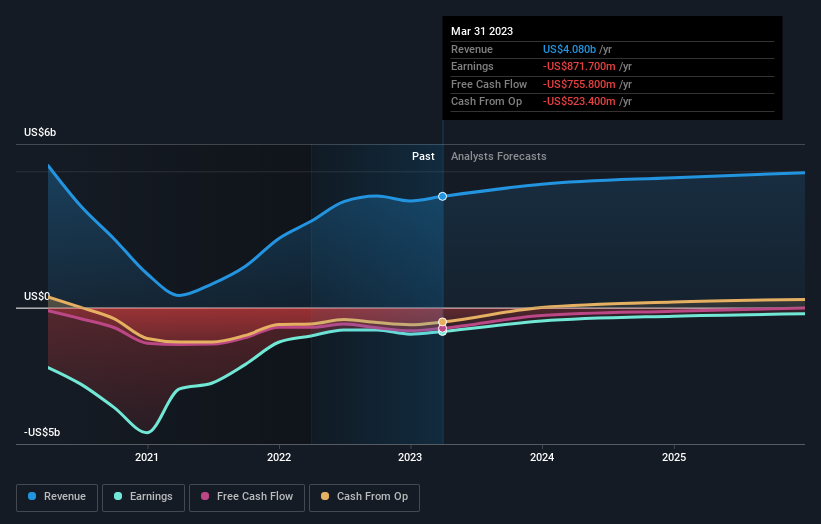While individual investors in AMC Entertainment Holdings, Inc. (NYSE:AMC) saw 6.3% gain in value of holdings last week, institutions remain on the sidelines
Key Insights
AMC Entertainment Holdings' significant individual investors ownership suggests that the key decisions are influenced by shareholders from the larger public
A total of 25 investors have a majority stake in the company with 25% ownership
Analyst forecasts along with ownership data serve to give a strong idea about prospects for a business
A look at the shareholders of AMC Entertainment Holdings, Inc. (NYSE:AMC) can tell us which group is most powerful. And the group that holds the biggest piece of the pie are individual investors with 25% ownership. Put another way, the group faces the maximum upside potential (or downside risk).
Last week, Individual investors saw their shareholdings value go up 6.3% last week even as institutions continue to take precautions. With a market capitalization of US$4.3b, AMC Entertainment Holdings is rather large. We'd expect to see institutional investors on the register. Companies of this size are usually well known to retail investors, too.
Let's delve deeper into each type of owner of AMC Entertainment Holdings, beginning with the chart below.
Check out our latest analysis for AMC Entertainment Holdings
What Does The Institutional Ownership Tell Us About AMC Entertainment Holdings?
Institutions typically measure themselves against a benchmark when reporting to their own investors, so they often become more enthusiastic about a stock once it's included in a major index. We would expect most companies to have some institutions on the register, especially if they are growing.
As you can see, institutional investors have a fair amount of stake in AMC Entertainment Holdings. This suggests some credibility amongst professional investors. But we can't rely on that fact alone since institutions make bad investments sometimes, just like everyone does. If multiple institutions change their view on a stock at the same time, you could see the share price drop fast. It's therefore worth looking at AMC Entertainment Holdings' earnings history below. Of course, the future is what really matters.
We note that hedge funds don't have a meaningful investment in AMC Entertainment Holdings. Our data shows that The Vanguard Group, Inc. is the largest shareholder with 9.8% of shares outstanding. BlackRock, Inc. is the second largest shareholder owning 4.0% of common stock, and State Street Global Advisors, Inc. holds about 1.5% of the company stock.
Our studies suggest that the top 25 shareholders collectively control less than half of the company's shares, meaning that the company's shares are widely disseminated and there is no dominant shareholder.
Researching institutional ownership is a good way to gauge and filter a stock's expected performance. The same can be achieved by studying analyst sentiments. There are a reasonable number of analysts covering the stock, so it might be useful to find out their aggregate view on the future.
Insider Ownership Of AMC Entertainment Holdings
The definition of company insiders can be subjective and does vary between jurisdictions. Our data reflects individual insiders, capturing board members at the very least. Company management run the business, but the CEO will answer to the board, even if he or she is a member of it.
Insider ownership is positive when it signals leadership are thinking like the true owners of the company. However, high insider ownership can also give immense power to a small group within the company. This can be negative in some circumstances.
Our most recent data indicates that insiders own less than 1% of AMC Entertainment Holdings, Inc.. It's a big company, so even a small proportional interest can create alignment between the board and shareholders. In this case insiders own US$7.5m worth of shares. It is good to see board members owning shares, but it might be worth checking if those insiders have been buying.
General Public Ownership
With a 25% ownership, the general public, mostly comprising of individual investors, have some degree of sway over AMC Entertainment Holdings. This size of ownership, while considerable, may not be enough to change company policy if the decision is not in sync with other large shareholders.
Next Steps:
I find it very interesting to look at who exactly owns a company. But to truly gain insight, we need to consider other information, too. Be aware that AMC Entertainment Holdings is showing 5 warning signs in our investment analysis , and 2 of those are significant...
If you would prefer discover what analysts are predicting in terms of future growth, do not miss this free report on analyst forecasts.
NB: Figures in this article are calculated using data from the last twelve months, which refer to the 12-month period ending on the last date of the month the financial statement is dated. This may not be consistent with full year annual report figures.
Have feedback on this article? Concerned about the content? Get in touch with us directly. Alternatively, email editorial-team (at) simplywallst.com.
This article by Simply Wall St is general in nature. We provide commentary based on historical data and analyst forecasts only using an unbiased methodology and our articles are not intended to be financial advice. It does not constitute a recommendation to buy or sell any stock, and does not take account of your objectives, or your financial situation. We aim to bring you long-term focused analysis driven by fundamental data. Note that our analysis may not factor in the latest price-sensitive company announcements or qualitative material. Simply Wall St has no position in any stocks mentioned.

 Yahoo News
Yahoo News 


